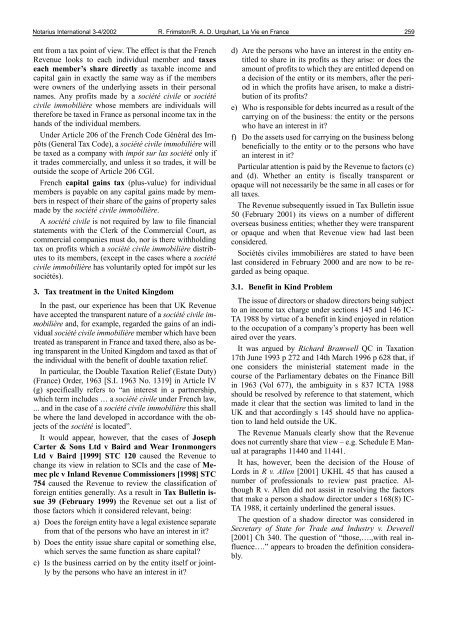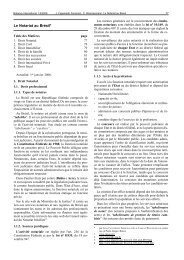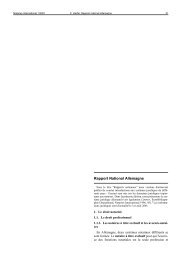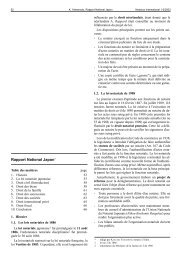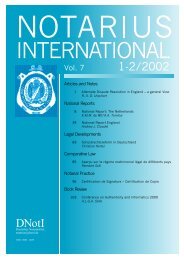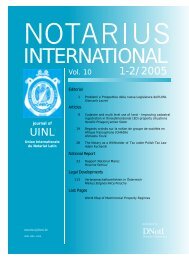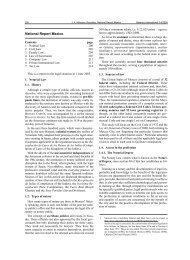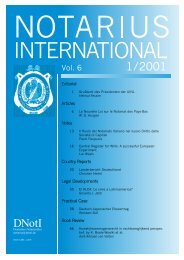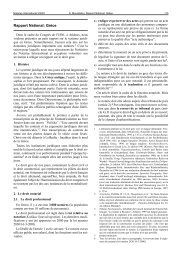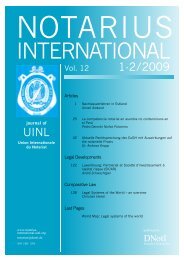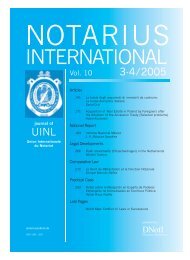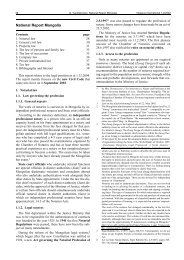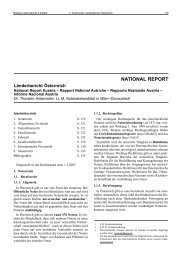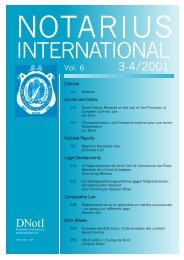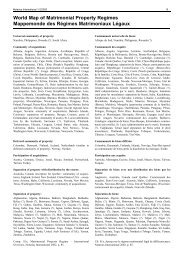ARTICLES and NOTES - Notarius International
ARTICLES and NOTES - Notarius International
ARTICLES and NOTES - Notarius International
Create successful ePaper yourself
Turn your PDF publications into a flip-book with our unique Google optimized e-Paper software.
<strong>Notarius</strong> <strong>International</strong> 3-4/2002 R. Frimston/R. A. D. Urquhart, La Vie en France 259<br />
ent from a tax point of view. The effect is that the French<br />
Revenue looks to each individual member <strong>and</strong> taxes<br />
each member’s share directly as taxable income <strong>and</strong><br />
capital gain in exactly the same way as if the members<br />
were owners of the underlying assets in their personal<br />
names. Any profits made by a société civile or société<br />
civile immobilière whose members are individuals will<br />
therefore be taxed in France as personal income tax in the<br />
h<strong>and</strong>s of the individual members.<br />
Under Article 206 of the French Code Général des Impôts<br />
(General Tax Code), a société civile immobilière will<br />
be taxed as a company with impôt sur las société only if<br />
it trades commercially, <strong>and</strong> unless it so trades, it will be<br />
outside the scope of Article 206 CGI.<br />
French capital gains tax (plus-value) for individual<br />
members is payable on any capital gains made by members<br />
in respect of their share of the gains of property sales<br />
made by the société civile immobilière.<br />
A société civile is not required by law to file financial<br />
statements with the Clerk of the Commercial Court, as<br />
commercial companies must do, nor is there withholding<br />
tax on profits which a société civile immobilière distributes<br />
to its members, (except in the cases where a société<br />
civile immobilière has voluntarily opted for impôt sur les<br />
sociétés).<br />
3. Tax treatment in the United Kingdom<br />
In the past, our experience has been that UK Revenue<br />
have accepted the transparent nature of a société civile immobilière<br />
<strong>and</strong>, for example, regarded the gains of an individual<br />
société civile immobilière member which have been<br />
treated as transparent in France <strong>and</strong> taxed there, also as being<br />
transparent in the United Kingdom <strong>and</strong> taxed as that of<br />
the individual with the benefit of double taxation relief.<br />
In particular, the Double Taxation Relief (Estate Duty)<br />
(France) Order, 1963 [S.I. 1963 No. 1319] in Article IV<br />
(g) specifically refers to “an interest in a partnership,<br />
which term includes … a société civile under French law,<br />
... <strong>and</strong> in the case of a société civile immobilière this shall<br />
be where the l<strong>and</strong> developed in accordance with the objects<br />
of the société is located”.<br />
It would appear, however, that the cases of Joseph<br />
Carter & Sons Ltd v Baird <strong>and</strong> Wear Ironmongers<br />
Ltd v Baird [1999] STC 120 caused the Revenue to<br />
change its view in relation to SCIs <strong>and</strong> the case of Memec<br />
plc v Inl<strong>and</strong> Revenue Commissioners [1998] STC<br />
754 caused the Revenue to review the classification of<br />
foreign entities generally. As a result in Tax Bulletin issue<br />
39 (February 1999) the Revenue set out a list of<br />
those factors which it considered relevant, being:<br />
a) Does the foreign entity have a legal existence separate<br />
from that of the persons who have an interest in it<br />
b) Does the entity issue share capital or something else,<br />
which serves the same function as share capital<br />
c) Is the business carried on by the entity itself or jointly<br />
by the persons who have an interest in it<br />
d) Are the persons who have an interest in the entity entitled<br />
to share in its profits as they arise: or does the<br />
amount of profits to which they are entitled depend on<br />
a decision of the entity or its members, after the period<br />
in which the profits have arisen, to make a distribution<br />
of its profits<br />
e) Who is responsible for debts incurred as a result of the<br />
carrying on of the business: the entity or the persons<br />
who have an interest in it<br />
f) Do the assets used for carrying on the business belong<br />
beneficially to the entity or to the persons who have<br />
an interest in it<br />
Particular attention is paid by the Revenue to factors (c)<br />
<strong>and</strong> (d). Whether an entity is fiscally transparent or<br />
opaque will not necessarily be the same in all cases or for<br />
all taxes.<br />
The Revenue subsequently issued in Tax Bulletin issue<br />
50 (February 2001) its views on a number of different<br />
overseas business entities; whether they were transparent<br />
or opaque <strong>and</strong> when that Revenue view had last been<br />
considered.<br />
Sociétés civiles immobilières are stated to have been<br />
last considered in February 2000 <strong>and</strong> are now to be regarded<br />
as being opaque.<br />
3.1. Benefit in Kind Problem<br />
The issue of directors or shadow directors being subject<br />
to an income tax charge under sections 145 <strong>and</strong> 146 IC-<br />
TA 1988 by virtue of a benefit in kind enjoyed in relation<br />
to the occupation of a company’s property has been well<br />
aired over the years.<br />
It was argued by Richard Bramwell QC in Taxation<br />
17th June 1993 p 272 <strong>and</strong> 14th March 1996 p 628 that, if<br />
one considers the ministerial statement made in the<br />
course of the Parliamentary debates on the Finance Bill<br />
in 1963 (Vol 677), the ambiguity in s 837 ICTA 1988<br />
should be resolved by reference to that statement, which<br />
made it clear that the section was limited to l<strong>and</strong> in the<br />
UK <strong>and</strong> that accordingly s 145 should have no application<br />
to l<strong>and</strong> held outside the UK.<br />
The Revenue Manuals clearly show that the Revenue<br />
does not currently share that view – e.g. Schedule E Manual<br />
at paragraphs 11440 <strong>and</strong> 11441.<br />
It has, however, been the decision of the House of<br />
Lords in R v. Allen [2001] UKHL 45 that has caused a<br />
number of professionals to review past practice. Although<br />
R v. Allen did not assist in resolving the factors<br />
that make a person a shadow director under s 168(8) IC-<br />
TA 1988, it certainly underlined the general issues.<br />
The question of a shadow director was considered in<br />
Secretary of State for Trade <strong>and</strong> Industry v. Deverell<br />
[2001] Ch 340. The question of “those,….,with real influence….”<br />
appears to broaden the definition considerably.


